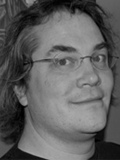GOTO is a vendor independent international software development conference with more that 90 top speaker and 1300 attendees. The conference cover topics such as .Net, Java, Open Source, Agile, Architecture and Design, Web, Cloud, New Languages and Processes
Thomas Rodgers, TweetSenior Developer at DRW Trading Group

Biography: Thomas Rodgers
Thomas is a software developer at DRW Trading Group with 20+ years experience in trading and industrial monitoring systems development. For the past eight years, Tom has specialized in building automated equity options trading platforms in a variety of languages.
Twitter: @rodgertq
Twitter: @rodgertq
Presentation: TweetJava vs. C/C++ Panel
Time:
Wednesday 12:10 - 13:00
/
Location:
French
This is a question that almost everyone doing a major project asks: should I use C++, or Erlang, or Java, or C#? Maybe it is more abstract than that, such as, should I use native code, like C++, or a managed runtime, like Java? Mostly, this is a matter of taste. Or is it? When it comes to ultimate performance, most applications are native, C++/C, with even having some hand crafted assembler mixed in. But can Java, or any managed runtime in general, do nearly as good? Or maybe it could do better than native code. What could applications do to leverage the most out of these languages? With C++11, has the game changed? With Java 7 or 8, has the game changed? Or has the game really changed with the acceptance of Erlang? These and more, fellow developers, will be questions asked on this panel. It is native code vs. managed runtime in the game of performance!
Panel: Gil Tene, Martin Thompson, Tom Rodgers, Artur Laksberg
Moderator: Todd Montgomery
Moderator: Todd Montgomery
Presentation: TweetIdiomatic Modern C++ Performance
Time:
Wednesday 15:10 - 16:00
/
Location:
French
A hallmark of C++ is the ability to create lightweight abstractions which are very close to the "metal". Over it's long history, C++ has accumulated a diverse set of programming models, usage idioms, and performance "folklore" which in many cases were intended for system architectures which no longer exist.
This talk will explore the features and performance realities of modern multi-core systems and C++11 features and "modern C++" idioms that
everage these architectures.
everage these architectures.
